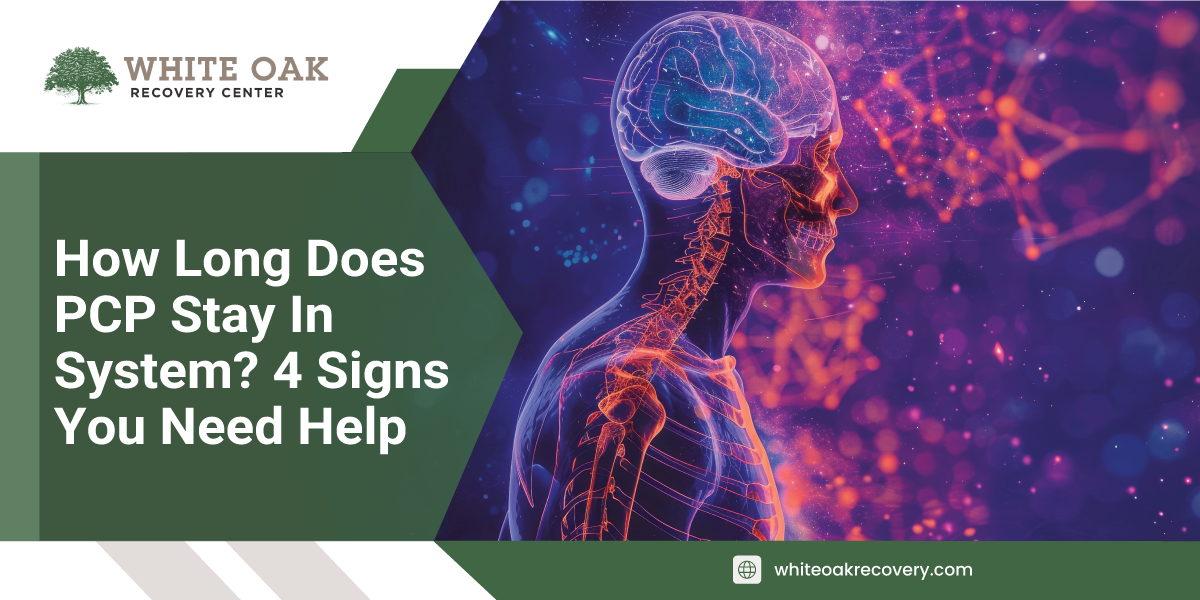How Long Does PCP Stay In System? 4 Signs You Need Help


Medical Writer:
Nisa Samar
Reviewer:

Johnny Kim
Executive Psychotherapist
Medical Writer:
Nisa Samar
Reviewer:

Johnny Kim
Executive Psychotherapist
Phencyclidine (PCP) is a dissociative drug. It comes as a powder, mixed with a liquid like alcohol or water, when consumed. After use, PCP remains in your body for the following period:
How long does PCP stay in system: more than 1 day to 10 days (average time)
The estimated half-life of PCP: 7-48 hours
The average half-life of PCP: 21 hours 1
Knowing how long PCP stays in the system can help you avoid the dangerous long-term effects of PCP and learn about the withdrawal process.
Are you developing a PCP addiction, or is someone around you struggling with it? White Oak Recovery Center can help. Call us at 1-844-955-2438.
Table of Contents
Toggle- How Long Does PCP Stay In System: Detection Timelines Breakdown
- 4 Factors That Affect How Long PCP Stays In the System
- Top 4 Signs You Need Help For PCP Addiction
- How White Oak Recovery Treats Each Stage of PCP Addiction
- PCP Addiction Treatment Duration At White Oak Recovery Center
- FAQs- How Long Does PCP Stay in System
- References
How Long Does PCP Stay In System: Detection Timelines Breakdown
Here is a breakdown of “how long does PCP stay in system” during various tests for drug and alcohol evaluation:
a) PCP in Urine Test
During a urine test, if you take PCP before 4-6 hours, it is detectable. For up to a week or two, it stays detectable through a urine test.
b) PCP in Blood Test
The detection window of PCP for this test can be 1 or 2 days following use.
c) PCP in Hair Test
This test can detect PCP for up to three months. This test is commonly done to determine if the person has used PCP drug in the past.
d) PCP in Saliva Test
A mouth swab test can be done to determine the presence of PCP in the body after use. It can detect the drug for around 24 to 72 hours.
4 Factors That Affect How Long PCP Stays In the System
If you are facing a test for drug and alcohol evaluation or have PCP addiction, you would want to know how long does PCP stay in system. There is no one answer to it, as it can differ from person to person due to the following factors.
1. Dosage
The body takes longer to eliminate PCP completely if the dosage is high.
2. Frequency of Use
If a person uses PCP frequently, clearance will take much longer.
3. Lifestyle Habits
If a person follows an organic diet, including fruits and vegetables, and drinks plenty of water, the body will remove toxins more efficiently.
4. Metabolism
To expedite the PCP excretion from the system, an individual must have a fast metabolism. Metabolism depends on genetics, liver and kidney function, age, and other factors.

Top 4 Signs You Need Help For PCP Addiction
People who can’t seem to quit PCP drug despite an upcoming drug test for employment most likely have a PCP addiction. To identify the signs and symptoms of PCP addiction, you can look for changes in your overall physical, behavioral, and mental health.
1. Physical Signs of PCP Addiction
When a person uses PCP, the immediate changes in the body include sweating, flushed skin, and speech impairment. The physical long-term symptoms of PCP involve:
- Pale skin
- Noticeable weight loss
- Messy appearance (due to lack of self-care)
- Dilated pupils
- Uncoordinated walking patterns
2. Signs of Changes in Overall Health
PCP addiction is a threat to multiple organs, such as the heart, kidneys, and lungs. It puts a strain on the body, and heavy doses can be fatal. For instance, an overdose may lead to coma.
- Respiratory issues
- Consistent Coughing
- Frequent urination
- Chest pain
- Irregular heartbeat
3. Behavioral Signs of PCP Use
People with a history of PCP consumption experience massive personality changes as they start struggling to control impulses. If your loved ones have started to mention that you have become reckless, aggressive, or irritable, it may be because you have developed a PCP addiction.
4. Psychological Signs of PCP Addiction
As it interferes with the activity of neurotransmitters in the brain, you may experience these symptoms of PCP psychologically:
- Psychosis (visual and auditory hallucinations)
- Memory loss
- Confusion
- Reduced attention span
- Poor decision-making and problem-solving skills
- Disorientation
- Suicidal thoughts
According to a survey, over 6 million people aged 12 years and older have tried PCP once in their lives.
How White Oak Recovery Treats Each Stage of PCP Addiction
At our exclusive private rehab, our professional staff and DEA-certified specialists provide the following unique plans to get PCP out of your system.
| Common Symptoms of PCP | How Does It Feel | Treatment At White Oak Recovery Center |
|---|---|---|
| Anxiety & Depression | The interplay between PCP addiction and depressive symptoms leads to a devastating cycle that ruins personal and work life. | Our dual diagnosis treatment works on PCP addiction and mental wellness by reinforcing hope and the importance of complete recovery. |
| Suicidal thoughts | Due to the prolonged use of PCP, people may become suicidal or violent as it blocks the sensory mechanism. | Our luxury private rehab offers a peaceful and supportive setting for such individuals with our residential therapy. |
| PCP Withdrawal | If you stop taking PCP abruptly, you may experience seizures, intense craving, insomnia, mood swings, and depression. | In such cases, medical detox is the most effective. The staff at our luxury private rehab remains on standby around the clock to ensure your safety and comfort. |
| Psychosis & Cognitive Impairment (poor problem-solving skills, short attention span, etc.) | You may lose the perception of reality and start having irrational beliefs due to the hallucinogenic properties of the drug. | We offer CBT to help you adhere to your recovery goals, avoid triggers, and maintain a sense of accountability throughout the journey. |
| Behavioral changes, eating disorders, facing psychosocial issues, and poor coping mechanisms | PCP leads to nausea, which impacts appetite, resulting in eating disorders. You may feel a sense of separation from your thoughts and your surroundings. | Our Partial Hospitalization Program includes daily therapies, group therapy, and addiction awareness for intensive care in the early stages of PCP addiction recovery. |
| Flashbacks, Emotional Relapse | You may feel like returning to PCP to escape emotions like moodiness and anger. Flashbacks may take you back to experiencing the high of PCP, even a year after stopping. | Our luxury private rehab offers MAT, which is a combination of behavioral therapies, counseling, and medication for ongoing support. |
| Destructive behavior, emotional distress | Not being able to fulfill your daily responsibilities and impaired personal relationships. | Our certified DBT therapists teach you to regulate negative emotions and skills that help in recovering from co-occurring disorders. |
“It is pitiful what PCP does. It takes your whole mind. When I came to the rehab, it took a couple of minutes to get a word out. Now I am doing better.” –Theodore.
PCP Addiction Treatment Duration At White Oak Recovery Center
At a luxury private rehab like White Oak Recovery Center, every individual gets a customized plan for PCP addiction that is best-suited to their needs and schedule. Depending on the treatment plan, it may take several weeks to a few months to overcome PCP addiction.
Are you stressed that you might run into financial issues while getting treatment for PCP addiction? Verify your insurance today!
Don’t know how to break free from your PCP addiction? Help is a call 1-844-955-2438 away! Or, simply book your appointment here.
FAQs- How Long Does PCP Stay in System
Here are some FAQs related to: how long does PCP stay in system.
Does PCP show up on a drug test?
Yes. After use, this dissociative drug remains in the blood, saliva, hair, and urine. The detection window ranges from one day to 90 days, using various tests.
How long does 3-MEO-PCP stay in your system?
3-MEO PCP, or 3-Methoxyphencyclidine, is a derivative of PCP that is known to be more potent. The half-life of this derivative is around 10 to 11 hours.3
What medications test positive for PCP?
There are numerous drugs that may show PCP on a drug test.4 These medications include:
- Dextromethorphan
- Doxylamine
- Diphenhydramine
- Ibuprofen
- Imipramine
- Meperidine
- Ketamine
- Lamotrigine
- Tramadol
- Venlafaxine
What is the PCP treatment duration?
The duration of the treatment depends on the use history of PCP and its impact on the physical and mental health. It may last for many days to several months.
References
- https://www.ncbi.nlm.nih.gov/books/NBK507865/
- https://www.ojp.gov/ncjrs/virtual-library/abstracts/pcp-phencyclidine-drug-violence-and-death
- https://cdn.who.int/media/docs/default-source/controlled-substances/43rd-ecdd/3-meo-pcp-finalreport-a.pdf?sfvrsn=8c513cd7_2
- https://pmc.ncbi.nlm.nih.gov/articles/PMC5720316/


Am I covered for addiction treatment?
Your insurance may cover treatment. Call now for an entirely free and confidential assessment. Recovery starts with a phone call.

Medical Disclaimer:







